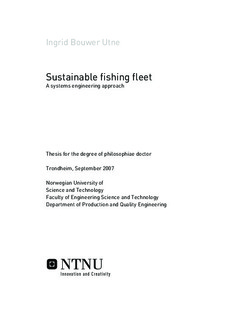Sustainable Fishing Fleet; a Systems Engineering Approach
Doctoral thesis
Permanent lenke
http://hdl.handle.net/11250/240598Utgivelsesdato
2007Metadata
Vis full innførselSamlinger
Sammendrag
Many fisheries have significant challenges related to sustainable development, such as overexploitation and overcapacity in the fishing fleet. Overcapacity leads to increased pressure on fish resources, reduced profitability, and environmental problems such as greenhouse gas (GHG) emissions and acidification fromfuel consumption. Sustainable management of the fish resources is an important objective in Norway, but overcapacity is a problem in several Norwegian fleet segments. Important issues in this respect are whether the traditional management models are able to deal with the capacity development, and whether the role of technology as a relevant discipline in fisheries management is underestimated.
The objective of this work has been to integrate a technological perspective into fisheries management in order to improve sustainability in the fishing fleet. The thesis work has been limited to the Norwegian fisheries in Norwegian territorialwaters. Since the main problems addressed in this thesis are sustainability and overcapacity, the system boundaries are limited to the fishing fleet. This means that the marine ecosystem in where the fishing vessels are interacting, is outside the thesis’ boundaries.
The main contributions of this thesis are:
• Development of a methodological framework that structures fisheries management decision-making, with main emphasis on improved sustainability in the fishing fleet.
• Clarification of the concept of sustainability in the Norwegian fishing fleet.
• Classification of attributes characterizing sustainability, and a performance evaluation of the different vessel groups in the cod-fishing fleet.
• Comparison of two cod-production systems, with focus on sustainability.
• Suggestions for how fisheries management can evaluate sustainability on a regular basis.
• Improved foundation for further research about sustainability in the fisheries. A lot of literature is collected and synthesized.
The framework developed is based on the systems engineering process. The nature of sustainability requires a systems perspective. There are different system analysis methods, but from a technological perspective, dealing with multidisciplinary tasks, systems engineering has been selected as the most feasible process. It has a strong focus on stakeholder needs and requirements, and it facilitates frequent evaluations of sustainability, which is important in order to assess management efficiency and goal achievement.
Problems regarding sustainability in the fisheries are not only caused by technological development, but have organizational challenges as well. However, in this thesis the focus is within the technological perspective. Systems engineering is not applied as an attempt to change the structure of fisheries management, but as means of suggesting a decision-making process that improves sustainability in the fishing fleet.
Fisheries management involves decision-making in situations often characterized by high risks and uncertainties, and it may be difficult to predict the outcomes of the decisions, for example, regarding sustainability in the fishing fleet. A number of tools that are available to support decision-making have been discussed and used in the thesis, such as cost-benefit analysis, risk acceptance criteria, life cycle cost (LCC), the Analytic Hierarchy Process (AHP), and Quality Function Deployment (QFD). Nevertheless, these tools do not provide “correct” answers; they have limitations, they are based on a number of assumptions, and their uses are based on scientific knowledge as well as value judgments involving political, strategic, and ethical issues. This means that these methods leave the decision-makers to apply decision processes outside the practical applications of the analyses, to which the framework offers guiding principles and structure.
The main outcome of using systems engineering principles in fisheries management, is that the framework offers a broader analytical perspective to fisheries management and sustainability, which acknowledge that sustainability cannot be distinguished fromthe context. Today, most input to fisheries management come from biology and economy, such as stock assessments and profitability analyses. In systems engineering, information from different scientific disciplines, for example, biology, social sciences, economy, and technology, are necessary input to the analyses and decision processes, because fisheriesmanagement is much more than bio-economics. Application of the systems engineering process in fisheries management, and the inclusion of technology, introduce new perspectives, new disciplines, and new stakeholders into the decision-making process in the fisheries.
Based on the framework developed in the thesis, the sustainability performance of the cod-fishing fleet has been evaluated. Sustainability in the fishing fleet may be characterized by seven attributes; accident risk, employment, profitability, quality, catch capacity, bycatch/selection, andGHGemissions/acidification. Indicators have been identified in order to measure the system performance within the attributes. The evaluation shows that there are differences in the performance of the vessel groups. These differences pose a major challenge to fisheries management in their decision-making regarding sustainability in the fleet. The smallest vessels have the lowest fuel consumption (kg fuel/kg fish), but they have a very high accident risk (FAR). The evaluation of cod fishing vs. cod farming shows that the potential growth in the cod farming industry may cause changes in the management system of the cod fisheries, such as a possible shift from the IVQ-systemof today to an ITQ-system.
The Norwegian fisheries management lacks frequent evaluations of its policies, and the information and data available about the fisheries are fragmented. Sustainability should be evaluated on a regular basis by use of performance indicators to determine if sustainability increases or decreases. For simplicity, the indicators could be aggregated into a sustainability index showing the overall system performance. Aggregation implies simplification and weighting of the indicators, which means that such an index should be used with care. Sustainability implies a long term perspective when taking decisions, because future generations will be affected. The performance evaluations can give indications of trends, which means that the results can be used to predict consequences in the future, based on the current development.
Består av
Utne, Ingrid Bouwer. Systems engineering principles in fisheries management. Marine Policy. 30: 624-634, 2006.Utne, Ingrid Bouwer. System evaluation of sustainability in the Norwegian cod-fisheries. Marine Policy. 31: 390-401, 2007.
Standal, Dag; Utne, Ingrid Bouwer. Can cod farming affect cod fishing? A system evaluation of sustainability. Marine Policy. 31: 527-534, 2007.
